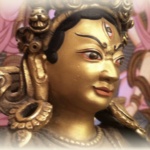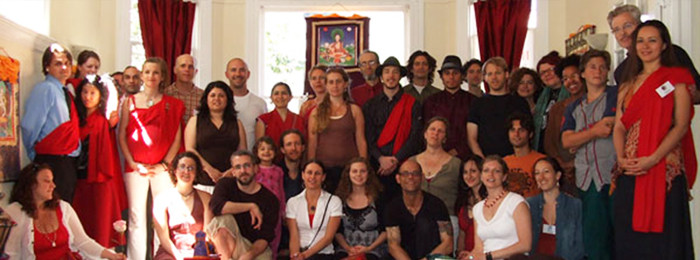
Sarah Jacoby studies Asian Religions with a specialization in Tibetan Buddhism. She received her B.A. from Yale University, majoring in women’s studies, and her M.A. and Ph.D. degrees from the University of Virginia’s Department of Religious Studies. She joined Northwestern University in 2009 after completing a postdoctoral fellowship at the Society of Fellows in the Humanities at Columbia University. Her research interests include Indo-Tibetan Buddhist doctrine and ritual in practice, studies in gender and sexuality, Tibetan literature, autobiography studies, Buddhist revelation, the history of emotions, Buddhism in contemporary Tibet, and eastern Tibetan area studies.
For an overview of Professor Jacoby’s research and teaching, see the article “Treasure Seeker” recently published by Northwestern News.
Professor Jacoby has received an American Council of Learned Sciences (ACLS) Fellowship and an American Academy of Religion International Collaborative Research Grant. Her research has also been funded by The Shelley & Donald Rubin Foundation, the Charlotte W. Newcombe Dissertation Writing Fellowship, the Fulbright Hays Dissertation Research Fellowship, and multiple Foreign Language and Area Studies Fellowships (FLAS).
Her first monograph Love and Liberation: Autobiographical Writings of the Tibetan Buddhist Visionary Sera Khandro (Columbia University Press, 2014) is the winner of the 2016 E. Gene Smith Book Prize from the Association of Asian Studies for books on Inner Asia and a finalist for the 2015 American Academy of Religion Book Award for Excellence in Historical Studies. Love and Liberation is the first study in any language of the autobiographical and biographical writings of one of the most prolific female authors in Tibetan history, Sera Khandro Künzang Dekyong Chönyi Wangmo (also called Dewé Dorjé, 1892–1940). She was extraordinary not only for achieving religious mastery as a Tibetan Buddhist visionary and guru to many lamas, monastics, and laity in the Golok region of eastern Tibet, but also for her candor. This book listens to Sera Khandro’s conversations with land deities, dakinis, bodhisattvas, lamas, and fellow religious community members whose voices interweave with her own to narrate what is both a story of love between Sera Khandro and her guru, Drimé Özer, and spiritual liberation.
Her other books include Buddhism: Introducing the Buddhist Experience (Oxford University Press, 2014, co-authored with Donald Mitchell), and Buddhism Beyond the Monastery: Tantric Practices and their Performers in Tibet and the Himalayas (Brill, 2009, co-edited with Antonio Terrone). Her current book project examines rare biographical and ritual texts written by the early 18th-century Tibetan religious hierarch Lelung Zhepai Dorjé.
In 2015 and 2018 Professor Jacoby was voted by Northwestern students onto the ASG Faculty Honor Roll. In 2014 she was awarded a Searle Center for Advanced Learning and Teaching Innovation in Teaching Grant. In 2012, she was voted onto the ASG Faculty Honor Roll and awarded a teaching excellence award from the Department of Religious Studies. Courses she teaches include Introduction to Buddhism, Buddhism and Gender, Buddhist Auto/biography, Tibetan Religion and Culture, Theory and Methods in the Study of Religion, Religion, Sexuality, and Celibacy, and Feminist Theory and the Study of Religion.
For information about the Khyentse Foundation Buddhist Studies Lecture Series that Professor Jacoby is chairing, see here.
Events with Sarah Jacoby
 Women in Tantric Buddhism – Self Paced Course
Women in Tantric Buddhism – Self Paced CourseOpen Dates
This is the missing history of women in Tantric Buddhism. This course addresses the fascinating story of nuns, mothers, teachers, consorts, prophets, and disciples. Taught by scholar-practitioners whose groundbreaking research on women and Buddhism has changed the way we think of Buddhist history. This course will address the history of women in Buddhism, the history of yoginis and dakinis in India and Tibet, the stories of important Buddhist women, Buddhist philosophy on gender, sex, and sexuality, and the role of the consort in historical Tibet, and contemporary manifestations and so much more. Support the Buddhist Studies Institute by donating for…

